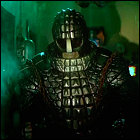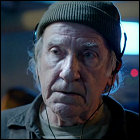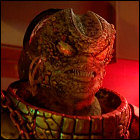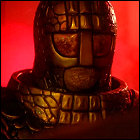 The TARDIS arrives aboard a Soviet nuclear submarine secretly operating near the North Pole in 1983, though the sub and her crew already have problems of their own. This doesn’t stop them from blaming the new arrivals for all of these problems, however. The real problem quickly becomes apparent to the Doctor: the Soviets retrieved a large chunk of ice with something humanoid inside, and thawed it out. The humanoid is an Ice Warrior with a bad reputation: the Martian warlord Skaldak. The Doctor’s attempts to appeal to Skaldak’s feudal sense of honor are useless, since Skaldak perceives the humans’ every act as an attack upon him. Skaldak unexpectedly leaves his armor, slithering around the innards of the sub in his native Martian form, eliminating the sub’s crew one by one. When the Ice Warrior learns that the sub is armed with nuclear weapons, he sees an opportunity to avenge his indignities upon the entire human race… unless the Doctor can stop him.
The TARDIS arrives aboard a Soviet nuclear submarine secretly operating near the North Pole in 1983, though the sub and her crew already have problems of their own. This doesn’t stop them from blaming the new arrivals for all of these problems, however. The real problem quickly becomes apparent to the Doctor: the Soviets retrieved a large chunk of ice with something humanoid inside, and thawed it out. The humanoid is an Ice Warrior with a bad reputation: the Martian warlord Skaldak. The Doctor’s attempts to appeal to Skaldak’s feudal sense of honor are useless, since Skaldak perceives the humans’ every act as an attack upon him. Skaldak unexpectedly leaves his armor, slithering around the innards of the sub in his native Martian form, eliminating the sub’s crew one by one. When the Ice Warrior learns that the sub is armed with nuclear weapons, he sees an opportunity to avenge his indignities upon the entire human race… unless the Doctor can stop him.
written by Mark Gatiss
directed by Douglas MacKinnon
music by Murray GoldCast: Matt Smith (The Doctor), Jenna-Louise Coleman (Clara), Liam Cunningham (Captain Zhukov), David Warner (Professor Grisenko), Tobias Menzies (Lieutenant Stepashin), Josh O’Connor (Piotr), James Norton (Onegin),
Charlie Anson (Belevich), Spencer Wilding (Skaldak), Nicholas Briggs (voice of Skaldak)
Notes: This is the first Ice Warrior story on television since 1974’s Monster Of Peladon, during Jon Pertwee’s last season as the third Doctor, though at least two other TV outings were planned with the Ice Warriors, Mission To Magnus (intended for the 1986 season with the sixth Doctor) and Thin Ice (a story outlined for the 1990 seventh Doctor season that never was, which also involved relations with the Soviet Union); both unfilmed television stories were later adapted for audio by Big Finish for the Lost Stories range. Big Finish has also pitted the fifth and eighth Doctors against the Ice Warriors in audio adventures. This is the first flesh-and-blood appearance in Doctor Who for actor David Warner, who has provided voices for animated episodes (Dreamland) and numerous audio adventures, even playing an alternate-timeline version of the Doctor himself in Big Finish’s Doctor Who Unbound series.
LogBook entry & review by Earl Green
Review: There’s much to like about Cold War, and a few things that just bothered me about it as well. If nothing else, its pacing is admirable: it was known long before broadcast that this would be the first Ice Warrior appearance on TV since 1974, and the much-anticipated alien – although, disappointingly, the only specimen of the Martian warlords to be  seen – was wreaking havoc even before the theme tune began. There’s nothing like getting straight down to opening all the presents under the tree!
seen – was wreaking havoc even before the theme tune began. There’s nothing like getting straight down to opening all the presents under the tree!
The real treat, however, was the decades-overdue appearance of David Warner in Doctor Who. I’ve been a Warner fan since the days of Tron and Time Bandits, and to be fair, he has been on the periphery for some time, via Big Finish (including two appearances as the Doctor himself – or at least an alternate-universe incarnation of him), and in the animated special Dreamland. But this is the first time he’s shown his face in the live-action television series proper, and while it’s not at the villain that one would almost stereotypically expect him to play, he steals the entire episode as  an Ultravox-fixated eccentric-but-kindly professor who has “future companion” written all over him. It really is a pity that he didn’t get to tag along for at least a couple of episodes.
an Ultravox-fixated eccentric-but-kindly professor who has “future companion” written all over him. It really is a pity that he didn’t get to tag along for at least a couple of episodes.
I have a couple of minor thematic and structural quibbles with the episodes. Cold War is an example of an episode that came to a screeching halt to make sure we got the obligatory “there’s something about Clara” scene jammed into it, much like the previous season’s fixation on reminders that the Doctor’s doom had been predicted. The reminder takes up valuable story time that would’ve been better spent on the tale at hand, and really doesn’t do anything to advance her story – another case where the attempts to pepper hints/reminders throughout the season really just elicit a “yeah, we know already!” But on a more fundamental level, it really isn’t much more than The Ice Warriors all over  again. Which is a safe bet – this series is for an audience too young to remember having seen the creatures’ first appearance in 1967.
again. Which is a safe bet – this series is for an audience too young to remember having seen the creatures’ first appearance in 1967.
And it would’ve been neat if, despite repeating the story structure of that Troughton-era classic, some parable could’ve been worked into the proceedings about the futility of the Cold War. Instead, the actual Cold War is reduced to a retro reference point, with no more impact than a mention of Ultravox. While most born since the Cold War relate this historical period to the Cuban Missile Crisis and quaint B&W public-safety-scare films about bomb shelters, the Cold War was not a retro reference point in 1983, and damn near came to a boil with the Able Archer ’83 exercise, a NATO wargame which the Soviet military mistook for a real escalation, and began preparing for a retaliatory strike… just weeks before The Five Doctors premiered, and a few weeks before that, Stanislav Petrov had to make a split-second call as to whether the incoming American ICBM warning he saw was a false alarm or not. There was still fear in the air. The Cold War wasn’t just this  thing that was going on while we were playing Atari and listening to Ultravox. It was this thing that was going on while we played Atari and listened to Ultravox and it permeated the culture to the point that we got movies like The Day After and Testament, and it informed and infused popular entertainment as late as 1985 (and let’s not forget the 1984 Doctor Who story Warriors Of The Deep, which predicted an extension of the Cold War into the next century). It was something that, if you grew up in that era, you were genuinely aware of and afraid of, even if it didn’t necessarily occupy your every waking thought. Though the Brits did expend quite
thing that was going on while we were playing Atari and listening to Ultravox. It was this thing that was going on while we played Atari and listened to Ultravox and it permeated the culture to the point that we got movies like The Day After and Testament, and it informed and infused popular entertainment as late as 1985 (and let’s not forget the 1984 Doctor Who story Warriors Of The Deep, which predicted an extension of the Cold War into the next century). It was something that, if you grew up in that era, you were genuinely aware of and afraid of, even if it didn’t necessarily occupy your every waking thought. Though the Brits did expend quite  a lot of concern over it, since the 1980s saw the expansion of the American nuclear arsenal into western Europe and Britain, which moved them into the “likely first strike targets” column.
a lot of concern over it, since the 1980s saw the expansion of the American nuclear arsenal into western Europe and Britain, which moved them into the “likely first strike targets” column.
That rant is entirely from a historical accuracy standpoint, and doesn’t really affect the enjoyment of the episode, but it informs my gut feeling that an opportunity for some Roddenberry-esque commentary was lost. Cold War, on its own, is an enjoyable episode whose much-touted returning monster turned out to be less central than one of its guest stars.
